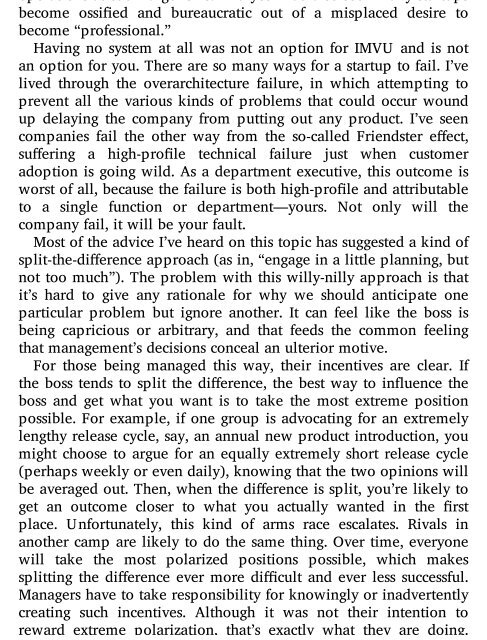Acclaim for THE LEAN STARTUP
The Lean Startup: How Today's Entrepreneurs Use Continuous ...
The Lean Startup: How Today's Entrepreneurs Use Continuous ...
- No tags were found...
You also want an ePaper? Increase the reach of your titles
YUMPU automatically turns print PDFs into web optimized ePapers that Google loves.
ecome ossied and bureaucratic out of a misplaced desire to<br />
become “professional.”<br />
Having no system at all was not an option <strong>for</strong> IMVU and is not<br />
an option <strong>for</strong> you. There are so many ways <strong>for</strong> a startup to fail. I’ve<br />
lived through the overarchitecture failure, in which attempting to<br />
prevent all the various kinds of problems that could occur wound<br />
up delaying the company from putting out any product. I’ve seen<br />
companies fail the other way from the so-called Friendster eect,<br />
suering a high-prole technical failure just when customer<br />
adoption is going wild. As a department executive, this outcome is<br />
worst of all, because the failure is both high-prole and attributable<br />
to a single function or department—yours. Not only will the<br />
company fail, it will be your fault.<br />
Most of the advice I’ve heard on this topic has suggested a kind of<br />
split-the-dierence approach (as in, “engage in a little planning, but<br />
not too much”). The problem with this willy-nilly approach is that<br />
it’s hard to give any rationale <strong>for</strong> why we should anticipate one<br />
particular problem but ignore another. It can feel like the boss is<br />
being capricious or arbitrary, and that feeds the common feeling<br />
that management’s decisions conceal an ulterior motive.<br />
For those being managed this way, their incentives are clear. If<br />
the boss tends to split the dierence, the best way to inuence the<br />
boss and get what you want is to take the most extreme position<br />
possible. For example, if one group is advocating <strong>for</strong> an extremely<br />
lengthy release cycle, say, an annual new product introduction, you<br />
might choose to argue <strong>for</strong> an equally extremely short release cycle<br />
(perhaps weekly or even daily), knowing that the two opinions will<br />
be averaged out. Then, when the dierence is split, you’re likely to<br />
get an outcome closer to what you actually wanted in the rst<br />
place. Un<strong>for</strong>tunately, this kind of arms race escalates. Rivals in<br />
another camp are likely to do the same thing. Over time, everyone<br />
will take the most polarized positions possible, which makes<br />
splitting the dierence ever more dicult and ever less successful.<br />
Managers have to take responsibility <strong>for</strong> knowingly or inadvertently<br />
creating such incentives. Although it was not their intention to<br />
reward extreme polarization, that’s exactly what they are doing.




